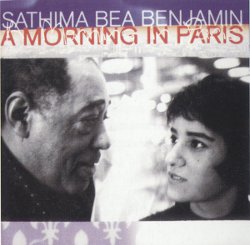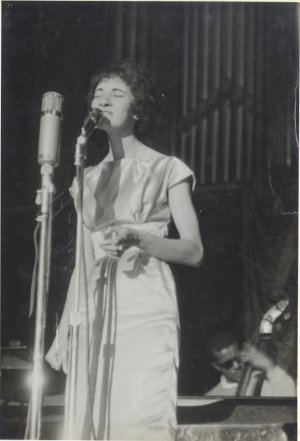Chapter 8
Sathima Bea Benjamin
Sathima Bea Benjamin in Johannesburg, South Africa, ca. 1958-9
From Sathima Bea Benjamin's private collection
Musical Echoes and the Poetics of a
South African-American Musical Self
by Carol Muller

Sathima Bea Benjamin grew up in Cape Town, South Africa, during the transition to apartheid in the 1940s. Taking melodies she heard on her grandmother's radio, she developed her own jazz singing voice, weaving in her own compositions. With a life embedded in an awareness of race and gender, she left for Europe in 1962. Her migratory lifestyle took her through tours in Europe, supporting her husband musician and caring for her daughters, to her own career development in New York City as a jazz singer with her own trio—a woman in a man's world—where she continues to record, create, and perform. Her vocality and life stories reveal risks, freedoms, and creative processes as she creates a counternarrative to the discourses of masculinity in jazz.
Carol Muller: "Sathima and I both spent our childhoods in Cape Town, South Africa and yet, despite a common point of origin our engagement with Cape Town was fundamentally different. Sathima was born in 1936, twelve years before what became known as the apartheid government, came to power. 1936 was the same year that my parents were born. I was born in Cape Town in 1963, just shy of three years after the infamous Sharpeville Massacre, and a year after Sathima left for Europe.
"We met in New York City in 1989 when I was a graduate student at New York University, and Sathima and her husband, jazz pianist Abdullah Ibrahim, were living in exile from South Africa. I had called to speak to Abdullah Ibrahim but he was not home. Sathima and I talked and agreed to meet to discuss her own life and music. We would do this many times, mostly with a recording device between us. In the mid 1990s we decided to write a book together, and so I began to do oral history research amongst family members and musicians involved with South African jazz, particularly as it happened in Cape Town in the 1950s and early 1960s.

"The piece of Sathima's life that was the most challenging to reconstruct however, was her time as a jazz migrant in Europe from the early 1960s through 1977, when she and Abdullah decided to base themselves in New York City at the famous Chelsea Hotel until South Africa was liberated. In 2006 I discovered a CIA archive about African musicians, writers and artists in England and Europe in the 1960s. Contained inside the archive of London's Transcription Center—the place poorly funded by the CIA—were letters and other documents by and about Sathima and Abdullah.
"While Sathima has focused on performing and recording, I have done the interviewing, archival work, and writing. We hope that our co-authored, experimental book about her life and our working relationship will inform many about Sathima's extraordinary life and artistry, but also enable some to rethink the contours of thinking about jazz, diaspora, song, creativity, and South Africa's place in the story.”
Visit Sathima Bea Benjamin's official website: sathimabeabenjamin.com.
Musical Echoes: South African Women Thinking in Jazz by Carol Ann Muller and Sathima Bea Benjamin, available from Duke University Press
Sathima's Windsong trailer

